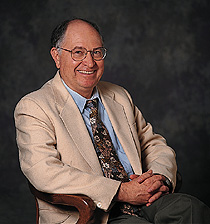


Bliquez won the battle but his father won the war. It is for teaching classical languages at the UW that Bliquez is being honored with a 1998 Distinguished Teaching Award.
It was in college that he discovered the charms of the classical world--first by participating in a "Great Books" program, then as a tutor for his roommate, who was taking Greek. The roommate dropped Greek, but Bliquez eventually earned his degree in Greek. Then came graduate school, and then came teaching.
"I stunk," is how Bliquez evaluates his teaching efforts during graduate school. He was still struggling when he got his first teaching job at San Francisco State University. But Bliquez wanted to be a good teacher, so he paid attention to student evaluations. "I could see that what I had going for me was my enthusiasm for the subject and the kind of personality students could relate to," he says now. "I tried to build on those."
By all accounts he's succeeded. One student commented that he knew Bliquez had taught a particular class many times, "but instead of boring, lackluster lectures, he brings excitement and energy to every session. It appears as if he is exploring the topics with us for the first time."
"He is incredibly attuned to his classes," says another student. "This is a professor who can look at me and tell if I understand something."
"There are certain parallels between what we humanists do and what clerics do," Bliquez says. "When you teach the classics, you're helping people to learn about themselves because you're giving them a model to compare themselves to. The Greeks and Romans, after all, raised most of the important questions--justice, duty, citizenship, statecraft, fate, God--and they gave some answers that are still interesting, even if you don't agree with them. These are questions I think every student should wrestle with."--Nancy Wick, UW News and Information
Return to the Beginning of "The Best of 1998"
Send a letter to the editor at columns@u.washington.edu.